October 1966
| << | October 1966 | >> | ||||
|---|---|---|---|---|---|---|
| Su | Mo | Tu | We | Th | Fr | Sa |
| 1 | ||||||
| 2 | 3 | 4 | 5 | 6 | 7 | 8 |
| 9 | 10 | 11 | 12 | 13 | 14 | 15 |
| 16 | 17 | 18 | 19 | 20 | 21 | 22 |
| 23 | 24 | 25 | 26 | 27 | 28 | 29 |
| 30 | 31 | |||||
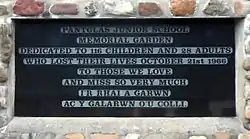
October 21, 1966: 116 schoolchildren in Wales killed in landslide
.jpg.webp)
October 5, 1966: "We Almost Lost Detroit"
_on_fire%252C_26_October_1966.jpg.webp)
October 26, 1966: 44 crew of USS Oriskany killed in ship fire
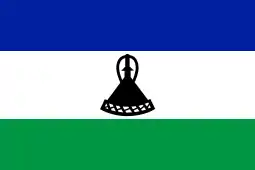
October 4, 1966: Kingdom of Lesotho granted independence
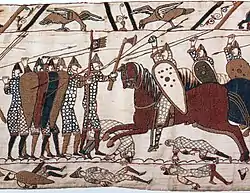
October 14, 1966: 900th anniversary of Battle of Hastings observed
The following events occurred in October 1966:
October 1, 1966 (Saturday)
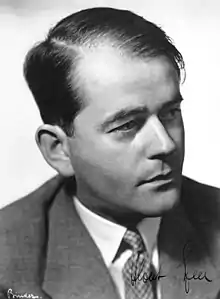
Speer
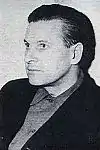
von Schirach
- Former Nazi leaders Albert Speer and Baldur von Schirach were released from Spandau Prison in Berlin, shortly after midnight, after 20 years of incarceration for war crimes.[1][2] The Soviet Union vetoed the release of the last remaining prisoner in Spandau, former Deputy Fuhrer Rudolf Hess.[3]
- West Coast Airlines Flight 956, a DC-9 jet, crashed 5.5 miles (8.9 km) south of Wemme, Oregon, while flying the last leg of its flight from San Francisco to Portland, through a heavy rainstorm. All 18 people on board were killed. The accident marked the first loss of a DC-9.[4][5]
- Born: George Weah, Liberian soccer player and winner of FIFA World Player of the Year award in 1995; in Monrovia
- Died: "Trigger Mike" Coppola, 66, New York mobster
October 2, 1966 (Sunday)
- Forty-three refugees from Cuba, along with a crew member, drowned after waves caused by the 125-mile-per-hour winds of Hurricane Inez swamped the twin-engine cruiser operated by Enrique "El Falco" Gonzalez. The craft broke apart in shark-infested waters while bringing the passengers to Florida. Gonzalez and one refugee, Jorge Garcia, clung to a raft for four days before being rescued by a freighter, but Garcia died shortly after being flown to a hospital at Homestead. Relatives of the victims had paid Gonzalez $1,000 apiece for each refugee for the chance to escape Cuba, and Gonzalez and first mate Enrique Oliva had departed while the hurricane was still in progress, risking the safety of their passengers because the Cuban patrol boats were tied up by the storm as well. Of ten people who were able to make it into a life raft, eight were swept off of it by powerful wave.[6]
- The once-thriving town of Quandahl, Iowa, located in Allamakee County, was sold at a public auction for $15,300. Founded by immigrants from Norway in the 19th century, the unincorporated village had had a bank, post office, dry goods and hardware stores, a grocery store and other businesses only 30 years earlier before a steady decline in the economy.[7][8][9]
- The 1966 United States Grand Prix was held at Watkins Glen Grand Prix Race Course, and was won by Jack Brabham.
- The first in a series of four plays in the Theatre 625 anthology strand, titled "Talking to a Stranger", was broadcast on BBC2.[10] Hailed by critics as one of the most important television dramas of the 1960s, it would go on to be placed seventy-eighth in a 2000 poll of industry professionals conducted by the British Film Institute to determine the 100 Greatest British Television Programmes of the 20th century.[11]
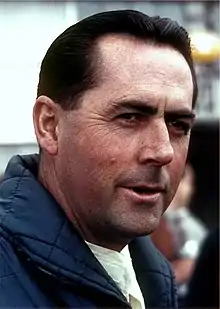
Jack Brabham
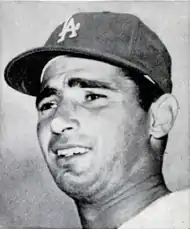
Sandy Koufax
- The 1966 Major League Baseball regular season came to a close as Sandy Koufax pitched the Los Angeles Dodgers to a 6-3 win over the Philadelphia Phillies to clinch the National League pennant and the right to face the Baltimore Orioles in the World Series.[12] In the American League, the perennial pennant-winners, the New York Yankees, finished in last place for the first time since 1913. With 70 wins and 89 losses, they were half a game behind the Boston Red Sox, and 26 1/2 games out of first place, despite a 2-0 win over the Chicago White Sox on the last day.[13]
- The Soviet military newspaper Red Star published an article that officially confirmed suspicions that military advisers from the U.S.S.R. were aiding the North Vietnamese. According to the article, rocket specialists had been sent to train the Vietnamese on how to fire surface-to-air anti-aircraft missiles, and had been forced to dodge bombing runs made by the United States.[14]
- Born: Thor Gjermund Eriksen, Norwegian journalist and editor, Director-General of the Norwegian Broadcasting Corporation, in Oslo
- Died:
- Egmont Arens, 76, American designer and pioneer in consumer packaging
- Luis Augusto Turcios Lima, 24, Guatemalan rebel leader, killed in a car accident[15]
October 3, 1966 (Monday)
- The Congress of Brazil voted to select Artur da Costa e Silva as the nation's 23rd President. Costa e Silva, a former General of the Brazilian Army and the hand-picked selection of President Humberto Castelo Branco, was unopposed, and received 295 votes from the majority party in Congress, the ARENA (Aliança REnovadora NAcional, or National Renewal Alliance). The opposing party, the Movimento Democrático Brasileiro (MDB), had only one-third of the seat in both the Chamber of Deputies and the Senate, and did not nominate a candidate, so Costa e Silva received the votes of 295 of the 472 electors.[16][17]
- Tunisia severed diplomatic relations with the United Arab Republic.
- In the United Kingdom, the Morpeth to Reedsmouth line of the Great North Eastern Railway was closed.
- Only one month before the general election, U.S. Representative Charles Weltner of Georgia removed his name from the ballot, because he could not uphold his signed oath to support the nominees of the state Democratic Party. "I cannot compromise with hate... I cannot vote for Lester Maddox," he said, referring to the segregationist who had won the Democratic nomination primary.[18] Fletcher Thompson, the Republican candidate, would go on to beat the replacement Democratic candidate, Archie Lindsey.
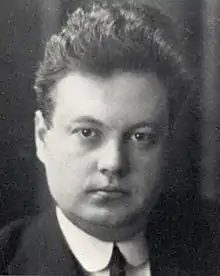
Rolf Sievert
- Died: Rolf Sievert, 70, Swedish physicist who pioneered the measurement of safe doses of radiation for medical treatment. The "sievert", abbreviated as "Sv" is the name that the International Committee for Weights and Measures would create in 1979 for a 100 roentgen unit of radiation dosage, and 1 Sv is the maximum cumulative radiation that a NASA astronaut is allowed during a career.[19] Other units named for Sievert are the millisievert (mSv) and the microsievert (μSv).
October 4, 1966 (Tuesday)
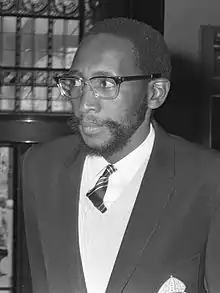
King Moshoehoe II
- Basutoland, a British colony surrounded completely by South Africa, was granted independence after midnight as the Kingdom of Lesotho, in a flag raising ceremony at Maseru.[20] The new nation was governed by a constitutional monarchy, with a bicameral Parliament consisting of a Senate and an elected National Assembly. The paramount chief of the Sotho people, Constantine Bereng Seeiso, was crowned as King Moshoeshoe II of Lesotho.[21][22]
- Israel applied for a treaty of association (though not a membership) in the European Economic Community (EEC), commonly referred to at the time as the "Common Market".[23]
- Died: Sherman Billingsley, 70, American nightclub owner who founded and owned the prestigious Stork Club in New York City
October 5, 1966 (Wednesday)
- The experimental Fermi 1 reactor at the Enrico Fermi Nuclear Generating Station, located near Detroit in Frenchtown Charter Township, Michigan, suffered a partial meltdown when its cooling system failed.[24] The incident would later become the subject of a 1975 bestselling book, We Almost Lost Detroit, by John G. Fuller.
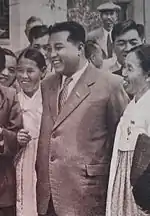
Kim Il Sung
- North Korea's leader Kim Il Sung delivered a speech to the Korean Workers' Party that would later serve as "a rare instance... in which the United States was able to eventually look back and realize that later actions could be traced back to this specific threatening signal." Specifically, Kim called on his followers to "wage a positive struggle against U.S. imperialism", in the form of limited warfare against the American military presence in South Korea. Almost immediately, there was a surge of provocations at the Korean Demilitarized Zone, and the most aggressive action of all, the 1968 seizure of the USS Pueblo and its crew.[25]
- UNESCO signed the Recommendation Concerning the Status of Teachers. This event is now celebrated as World Teachers' Day.
- The 1964 murder conviction and death sentence of Jack Ruby was reversed by the Texas Court of Criminal Appeals on grounds that the trial judge should have granted a motion for a change of venue to somewhere other than Dallas. "Jack Ruby was forced to trial under the most adverse, unusual, and extraordinary circumstances that this member of this court has yet to consider," Judge W.T. McDonald wrote in a concurring opinion. The Court remanded the case with instructions for a change of venue and a new trial. Ruby's fatal shooting of accused presidential assassin Lee Harvey Oswald had been witnessed by more people than any murder in history, as millions of people had watched the crime take place on live television on November 24, 1963.[26] Although a new trial would be scheduled for February in Wichita Falls, Texas, Ruby would become sick with pneumonia on December 9, and would die of a pulmonary embolism on January 3, 1967, at Parkland Memorial Hospital, where John F. Kennedy and Lee Harvey Oswald had both been pronounced dead.
- What would be described later as "the first successful, condemnatory burning of the Australian flag in recent memory" [27] took place in Canberra outside The Lodge, the official residence of the Prime Minister, as a group of 30 students protested against Australia's continued involvement in the Vietnam War. A prior attempt, on September 9, had been stopped by angry bystanders.
- Born: Sean Carroll, American theoretical physicist, in Philadelphia; Inessa Kravets, Russian athlete and holder of the women's world record for the triple jump for more than 20 years; in Dnipropetrovsk, Ukrainian SSR, Soviet Union
October 6, 1966 (Thursday)
- The hallucinogenic drug LSD (lysergic acid diethylamide) became illegal in the state of California as a new law went into effect at 12:01 a.m.[28] California became the first state in the U.S. to ban LSD, and in 1970, LSD would be reclassified as a Schedule I drug nationwide by the Controlled Substances Act.[29] The bill, sponsored by California state Senator Donald L. Grunsky, had been signed into law on May 30, 1966.[30]
- The Love Pageant Rally took place in the Panhandle of Golden Gate Park, a narrower section that projected into San Francisco's Haight-Ashbury district.[31]
- Born:
- Shirin Sharmin Chaudhury, the first female Speaker of the House for Bangladesh, in Noakhali[32]
- Niall Quinn, Irish soccer football player with 92 appearances for the Republic of Ireland national team, in Perrystown
- Died: Mitchell Fields (Mendel Feldman), 65, Romanian-American sculptor
October 7, 1966 (Friday)
- Eighteen teenagers from Cité des Jeunes High School, and a 21 year old driver, were killed in Dorion, Quebec, when their school bus was struck by a Canadian National Railways freight train at a railroad crossing. The 42 passengers had recently won student government elections, and were on their way to a dance at nearby Hudson. At 7:35 p.m., the bus had pulled onto the tracks and hadn't completed its crossing when the freight train sliced through it at 60 miles per hour.[33][34]
- The Jet Propulsion Laboratory in Pasadena, California, announced for the first time that NASA was considering JPL's suggestion for what would become the "Grand Tour program" after JPL aerospace engineer Gary Flandro pointed out the approach of a rare opportunity for exploration of four outer planets Jupiter, Saturn, Uranus and Neptune with one spacecraft.[35] Flandro had noted that if a probe could be readied for launch within 12 years, the four planets would be closely aligned so that an optimal liftoff date of October 7, 1978 would reach all four over a nine year voyage; a similar positioning of the planets would not happen again for 180 years. Homer Joe Stewart, JPL's manager of advanced studies, would tell the press a month later that by the late 1970s, solar-electric systems could be developed for taking advantage of gravity assist (commonly called the "slingshot effect") to use one planet's gravitational field to propel a probe at high speed to the next planet on the tour.[36] Given funding for two probes in case one failed, NASA would launch both in the summer of 1977, with Voyager 2 lifting off on August 20, 1977 and Voyager 1 16 days later on September 5. The alignment of Jupiter, Saturn, Uranus and Neptune will not happen again until the year 2155.[37]
- The Soviet Union declared that all Chinese students must leave the country before the end of October. According to the Soviet news agency TASS, the order came under "the principle of reciprocity" after the Communist Chinese government had declared on September 20 that it would cease allowing Soviet exchange students to study at Chinese universities.[38]
- In a major foreign policy speech in New York City to the National Conference of Editorial Writers, U.S. President Johnson said that if the Soviet Union reduced its military forces in central Europe (East Germany and Czechoslovakia in particular), the United States would do the same and would urge its NATO allies to follow suit.[39] "Europe is partitioned," he said, and referring to Germany, added "An unnatural line runs through the heart of a very great and a very proud nation. History warns us that until this harsh division has been resolved, peace in Europe will never be secure. We must turn to one of the great unfinished tasks of our generation--and that unfinished task is making Europe whole again".[40]
- Born: Sherman Alexie, American filmmaker and poet, in Spokane, Washington
- Died:
- Johnny Kidd (stage name for Frederick Albert Heath), 30, British rock singer and lead singer for Johnny Kidd & the Pirates. Kidd was killed in a car accident, when the car he was riding in collided head-on with another vehicle.;[41]
- Juan Batlle Planas, 55, Argentine surrealist painter
October 8, 1966 (Saturday)
- An attempt to protect ten offshore oil workers from the approach of Hurricane Inez ended in tragedy when the evacuation helicopter crashed only seconds after Shell Oil employees had climbed aboard. The Bell 204 had lifted off from oil platform, but fell 300 feet into the Gulf of Mexico only 30 seconds after takeoff, killing all 11 people on board.[42]
- Two days before Soviet Foreign Minister Andrei A. Gromyko met with U.S. President Lyndon Johnson, the Soviet Union announced that it was rejecting the United Kingdom's six-point plan to end the Vietnam War. British Foreign Secretary George Brown met with Gromyko in London, and proposed that the two nations arrange a peace conference in Geneva. The Soviet position was that, until North Vietnam requested a conference, the U.S.S.R. would not push for peace negotiations.[43]
- Born: Felipe Camiroaga, Chilean television presenter, in Santiago (d. 2011)[44]
- Died: Célestin Freinet, 69, French educator who founded the Modern School Movement
October 9, 1966 (Sunday)
- The Baltimore Orioles defeated the Los Angeles Dodgers in Game 4 of the World Series, 1–0, to sweep the series for their first world championship. Frank Robinson clouted a home run in the fourth inning.[45]
- One hundred and sixty-eight civilians were allegedly massacred by South Korean forces in the village of Binh Tai in South Vietnam's Sông Bé Province.[46]
- Born:
- David Cameron, Prime Minister of the United Kingdom from 2010 to 2016, in Marylebone, London
- Yekaterina Golubeva, Russian film actress, in Leningrad (d. 2011)
October 10, 1966 (Monday)
.png.webp)
The Beach Boys
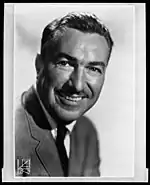
Congressman Powell
- The first world conference on Communication with extraterrestrial intelligence (CETI) was convened, by members of the International Academy of Astronautics, in Madrid. The study group consisted of four scientists from the U.S. (Fred L. Whipple, Frederick I. Ordway III, A. G. Haley and E. B. Konecci), two from the U.S.S.R. (Iosif Shklovsky and Vitaly Ginzburg), and one each from Sweden (Carl-Johan Clemedson) and Czechoslovakia (Chairman Rudolf Pešek).[47]
- The Beach Boys released their hit song "Good Vibrations", their most popular record ever. The song would reach #1 on the charts in the United States, the United Kingdom, Australia, New Zealand and Malaysia.[48]
- U.S. Representative Adam Clayton Powell of New York was found guilty of five counts of criminal contempt by a unanimous jury verdict. Powell had been prosecuted after repeatedly disobeying court orders to appear for questioning regarding his failure to pay a $164,000 defamation judgment, and faced a jail term of up to 150 days.[49]
- Bob Moog applied for the only patent ever granted for his invention, the Moog synthesizer, specifically for the Moog ladder filter that provides the electronic tones that give the synthesizer its distinctive sound. The patent would be granted on October 28, 1969.[50]
- The NATO Defense College was moved from Paris to Rome, 15 years after its creation on November 19, 1951.[51]
- Ghalib II al-Qu'aiti became the Sultan of Qu'aiti, now a part of Yemen.
- Born:
- Tony Adams, English footballer with 65 appearances on the English national team, in Romford
- Carolyn R. Bertozzi, American chemist, in Boston
- Bai Ling, Chinese actress, in Chengdu
- Died:
- Wilfrid Lawson, 66, English actor, died of a heart attack.[52]
- Kurt Bolender, 54, German war criminal who eluded capture until 1961, by hanging himself during his trial
- Robert Desoille, 76, French psychotherapist
- Charlotte Cooper, 96, English tennis star who won five Wimbledon singles championships (1895, 1896, 1898, 1901 and 1908)
October 11, 1966 (Tuesday)
- France and the Soviet Union signed a treaty for cooperation in nuclear research.
- The Child Nutrition Act was signed into law by President Johnson. Among other things, it supplemented the existing National School Lunch Program by establishing the School Breakfast Program, initially as a two-year pilot program for schools in poor neighborhoods.[53]
- The Roman Catholic Diocese of Miracema do Tocantins and the Roman Catholic Diocese of Ipameri were established in Brazil.[54]
- Born: Luke Perry, American television actor (Beverly Hills, 90210), as Coy Luther Perry III, in Mansfield, Ohio
- Died: Roger Sherman Loomis, 78, American expert on medieval literature
October 12, 1966 (Wednesday)
- Only five months after it had become independent from the United Kingdom, Guyana found that its territory was being encroached upon by the neighboring nation of Venezuela. In February, Ankoko Island, located in the Cuyuni River that separated Venezuela and Guyana, had been divided by an agreement signed in Geneva, but Venezuelan troops moved onto the Guyanese half of the island after the British government had withdrawn.[55]
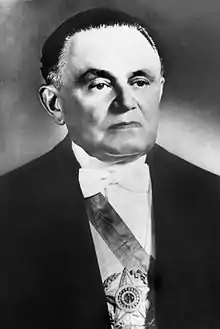
Castelo Branco
- Nine days after his civilian successor had been elected by the national congress, the Brazilian president, General Humberto Castelo Branco caused a constitutional crisis by issuing a decree removing six of the legislators from office. General Castelo Branco acted under a previously authorized procedure referred to as cassação de mandato (cancellation of mandate), despite having assured the President of the Chamber of Deputies, Adauto Lúcio Cardoso, that there would be no further cancellations. Cardoso defied his President, ruled that the six congressmen could continue to serve, and offered them an opportunity to defend themselves in Congress. Castelo Branco's use of force brought the two parties, ARENA and MDB, together in challenging the President, and on October 20, he would respond by closing the Brazilian Congress for one month, citing "counterrevolutionary elements who attempt to bring tumult" as his reason.[56]
- Gunter Schuller's opera, The Visitation, premiered in Hamburg, West Germany.[57]
October 13, 1966 (Thursday)
- Dr. Charles Brenton Huggins of the University of Chicago, and Dr. Peyton Rous of Rockefeller University, were awarded the 1966 Nobel Prize in Medicine for their contribution to cancer research.[58]
- The London Film Makers Cooperative (LFMC) was founded.[59]
- William R. Rivkin, 57, was appointed United States Ambassador to Senegal; Rivkin would die in post the following year.
- Died:
- Clifton Webb, 76, American stage and film actor best known for his "Mr. Belvedere" movies
- Arthur Lourié (Naum Izrailevich Luria), 74, Russian-born classical composer
October 14, 1966 (Friday)
- At 2:15 p.m. local time, the Montreal Metro, the new subway system for the Canadian city, was inaugurated with a declaration made by the guest of honor, French Minister of State Louis Joxe (as an emissary of French President De Gaulle) "and, within moments, trains filled with hundreds of special guests, pull out of 19 stations along north-south and east-west lines to converge on the Berri-de Montigny station, where the two lines meet." The first of 5,000 passengers that day were greeted by Mayor Jean Drapeau, Quebec Premier Daniel Johnson, Sr., and External Affairs Secretary Paul Martin.[60]
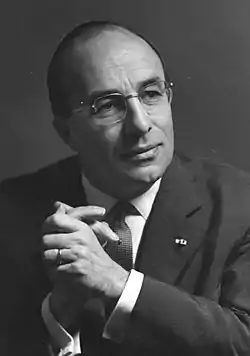
Jo Cals
- Jo Cals resigned as the Prime Minister of the Netherlands, along with his entire cabinet, after his own Catholic People's Party withdrew its support for him and pushed through a vote of no confidence. In the 150 member Second Chamber of the Staten-Generaal, the vote was 75-62 against the Cals government because of its unsuccessful fiscal policies, and only four of the 50 deputies from Cals's party supported him.[61]
- The 900th anniversary of the Battle of Hastings was observed, celebrating the pivotal October 14, 1066 confrontation of the Norman Conquest of England, the death in combat of King Harold II, and the beginning of a new regal dynasty under William the Conqueror became king after his armies killed. To mark the occasion, the General Post Office of the United Kingdom released 197,000,000 commemorative four-penny stamps throughout Britain. Philatelists purchased sheets of the stamps for their collections, and some found errors that increased the rarity (and the value) of their purchase, including one example in Parkstone where the image of the Queen had been omitted.[62]
- After his return from his tour of South Vietnam, U.S. Secretary of Defense Robert S. McNamara sent a secret memo to President Johnson conceding that the U.S. effort in the Vietnam War was failing, noting that the government of North Vietnam "knows that we can't achieve our goals. The prognosis is bad that the war can be brought to a satisfactory conclusion within the next two years... I see no reasonable way to bring the war to an end soon." [63]
- The International Centre for Settlement of Investment Disputes (ICSID) was established as the Convention on the Settlement of Investment Disputes between States and Nationals of Other States went into effect upon ratification by 20 nations.[64]
- The North Yemen Civil War took on a larger dimension when government air raids villages in the northern mountains, including the bombing of two villages in Saudi Arabia.[65]
- The Soviet optical film-return reconnaissance satellite Kosmos 129 was launched from Plesetsk Cosmodrome.[66]
October 15, 1966 (Saturday)
- U.S. President Lyndon B. Johnson signed a bill creating the United States Department of Transportation, the 12th Cabinet-level Department in the United States government. "During the next two decades," Johnson said, "the demand for transportation will be double. But we are already falling behind. Our lifeline is tangled." [67] The "DOT" would begin operations on April 1, 1967, with Alan S. Boyd as the first U.S. Secretary of Transportation.[68]
- On the same day, President Johnson signed the National Historic Preservation Act of 1966, creating the National Register of Historic Places that is maintained by the United States Department of the Interior.[69]
- ABC-TV telecast a highly acclaimed 90-minute television adaptation of the musical Brigadoon, starring Robert Goulet, Peter Falk, and Sally Ann Howes. It would win many Emmy Awards and would inaugurate a short-lived series of special television adaptations of famous Broadway musicals on ABC.
- Born: Jorge Campos, Mexican soccer football player with 130 appearances for the Mexico national team; in Acapulco
October 16, 1966 (Sunday)
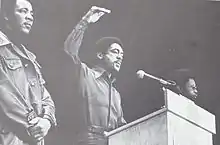
Seale
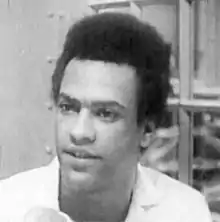
Newton
- In Oakland, California, the Black Panther Party was created by Bobby Seale and Huey P. Newton, who drafted the party's "Ten Point Program" with a list of "What We Want" and explanations of the demands under the heading "What We Believe".[70] Seale and Newton chose the name and logo after getting mail from a similarly named organization in Lowndes County, Alabama.[71]

Grace Slick
- One year to the day after her first performance for the rock group The Great Society, singer Grace Slick made her first appearance with Jefferson Airplane, beginning a twenty-year career that would see the group rise to international commercial success. In her debut with Jefferson Airplane, at The Fillmore in San Francisco, she replaced Signe Anderson.[72]
- In two associated referenda in Switzerland, voters were asked whether they approved of an amendment to the constitution on Swiss citizens living abroad and a popular initiative "for the fight against alcoholism". The constitutional amendment was approved while the popular initiative was rejected.[73]
- Born: Mary Elizabeth McGlynn, American voice actress,
- Died: George O'Hara, 67, American silent film actor and writer
October 17, 1966 (Monday)
- An earthquake struck Peru, killing more than 100 people.[74] The Huaura Province reported 72 deaths, most of them in the provincial capital at Huacho, while the port city of Callao, and the capital, Lima, also suffered fatalities.[75]
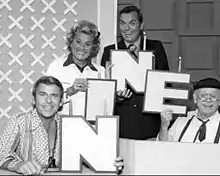
Some Hollywood squares
- At 11:30 a.m. Eastern time, The Hollywood Squares made its television debut as a new game show on the NBC television network.[76] The show, hosted by Peter Marshall, featured nine celebrities (mostly comedians) as panelists appearing on a set evocative of the game tic-tac-toe, and regularly featuring suggestive jokes and double entendres; although Paul Lynde would become identified with his place on the board, Ernest Borgnine occupied the center square on the first broadcast. The Squares format would inspire similar shows in other nations, starting with Celebrity Squares on Network Ten in Australia.[77]
- In Denver, Colorado, an American organization called Housewives for Lower Food Prices began a boycott of five major supermarket chains in the area, including Safeway, Red Owl, King Soopers, and Furr's groceries.[78] Publicity from the boycott led other groups in North America to begin their own campaigns to avoid overpriced food chains, spreading to cities like Dallas, Albuquerque, New Mexico, Charlotte, North Carolina and Windsor, Ontario.[79] and then to nearly half of the states in the U.S.[80] The protests (which included complaints about prices being driven up by giveaways and trading stamps programs would lead to Congressional investigations and ultimately stricter penalties for anti-competitive measures by grocers.[81]
- The 165 square mile Lochinvar Ranch was acquired by the government of Zambia from brothers Harry Wulfsohn and Edwin Wulfsohn, for 40,000 British pounds,[82] and transformed from a former cattle ranch into a wildlife preserve, which would reopen as the Lochinvar National Park in 1972. The park, with 420 different species of animals, is one of the most popular tourist attractions in the southern African nation.[83]
- Twelve New York firefighters were killed, and 17 others injured, in what was, at that time, the worst disaster in the history of the New York City Fire Department.[84] Most were members of Engine Company 18, and were on the ground floor of the Wonder Drug Store on East 23rd street when the terrazzo floor beneath them collapsed, plunging them into the fire in the basement and bringing down the walls on top of them.[85][86]
- Died:
- Karel Hruška, 75, Czech opera tenor, actor and radio personality
- Wieland Wagner, 49, German opera director, from lung cancer
- Dhammalok Mahasthavir, 76, Nepalese Buddhist monk who revived the Theravada branch
- Bob Swift, 51, former American League baseball catcher, three months after having to retire from managing the Detroit Tigers because of lung cancer
October 18, 1966 (Tuesday)
- Timothy Evans, who had been hanged in Britain's Pentonville Prison on March 9, 1950, for a double murder of which he had been innocent, received a posthumous pardon from Queen Elizabeth II after it was discovered that his confession had been coerced and that the chief witness against him, John Christie, had been a serial killer.[87]
- The Ford Cortina MK2 was launched in the United Kingdom.[88]
- The Apple Tree, a Jerry Bock and Sheldon Harnick musical, opened on Broadway for the first of 463 performances.[89]
- Born: Angela Visser, Netherlands beauty queen who was crowned Miss Universe in 1989; in Nieuwerkerk aan den IJssel
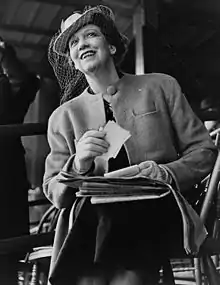
Elizabeth Arden
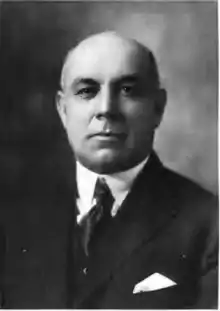
S.S. Kresge
- Died:
- Elizabeth Arden (Florence Nightingale Graham), 81, Canadian-born American beautician and cosmetics entrepreneur. One of the wealthiest women in the world, Arden left an estate of almost $50,000,000.[90]
- Sebastian S. Kresge, 99, American multimillionaire who turned a single "five and dime" store in Detroit into a nationwide chain of 930 S.S. Kresge stores across the United States, and the K-Mart discount department stores.[91]
October 19, 1966 (Wednesday)
- Bobby Orr, formerly the captain of the minor league Oshawa Generals played his very first National Hockey League game, appearing for the Boston Bruins, and beginning a 12-year career that would include eight consecutive awards of the James Norris Memorial Trophy for the NHL's best defenseman.[92]
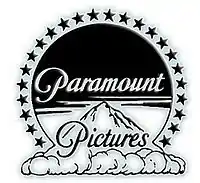

- Paramount Pictures was saved from bankruptcy when it was acquired by the conglomerate Gulf and Western Industries, an event that one film historian would later call "the birth of corporate Hollywood".[93]
- Born: Jon Favreau, American film director whose Paramount Pictures films, Iron Man and Iron Man 2 grossed a combined total of 1.2 billion dollars; in Flushing, Queens, New York
October 20, 1966 (Thursday)
- Soviet First Secretary Leonid Brezhnev and his guests (including Fidel Castro of Cuba, Nicolae Ceaușescu of Romania, János Kádár of Hungary, Willi Stoph of East Germany, Yumjaagiin Tsedenbal and the Communist Party leaders of several other Soviet allies) were at Baikonur Cosmodrome to witness Operation Palma 3, the launch of five rockets and missiles. In addition to the powerful N1 rocket that placed a seventh Molniya-1 communications satellite into orbit,[94] the leaders also watched four ICBM launches, with a UR-100 (known in the West as the SS-11 Sego), an R-36 (the SS-9 Scarp and two R-36 missiles (SS-7 Saddler), one from a missile silo and the other from the ground.[95]
- The West German submarine U-9 was launched. After being decommissioned in 1993, the 144 foot long sub would be displayed as a permanent exhibit outside the Technology Museum in the city of Speyer, Rheinland-Pfalz.
- Born: Stefan Raab, German television comedian and musician, in Köln, West Germany
- Died:
- Harry F. Byrd, 79, U.S. Senator for Virginia for more than 32 years and one of the most powerful men in the U.S. Senate until his resignation for health reasons in 1965. As Governor of Virginia from 1926 to 1930, he reduced the state government from 100 departments to only 12, and turned a deep deficit into a financial surplus in four years, and called himself the "fiscal watchdog" over the federal budget. In 1960, despite not being on the ballot for president, Byrd received 15 electoral votes from dissatisfied Electoral College members in Mississippi, Alabama and Oklahoma.[96]
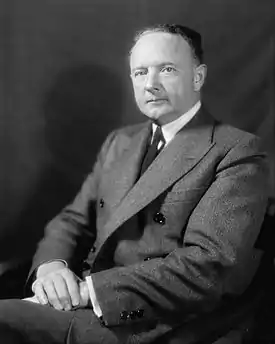
Senator Byrd
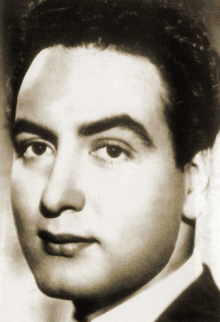
Composer Fawzi
- Mohamed Fawzi, 48, Egyptian composer who wrote the music for '"Kassaman", adopted in 1963 as the National Anthem of Algeria
October 21, 1966 (Friday)
- An avalanche killed 116 schoolchildren and 28 adults at Pantglas Junior School in the South Wales village of Aberfan. At 9:15 in the morning, shortly after the school day had started, a slag heap (or spoil tip) overlooking the school suddenly collapsed, sending two million tons of rock, coal and mud cascading down the hill.[97] Over the years, the heap had risen to a height of 80 feet, until heavy rains weakened it. Most of the children, who were buried alive in their classrooms, ranged in age from eight years old to ten years old.[98] It would later be discovered to have been caused by a build-up of water in the accumulated rock and shale, which suddenly started to slide downhill in the form of slurry.[99][100]
- The AFL-NFL merger was approved by the United States Congress. According to later reports, Congressman Hale Boggs, the majority whip of the U.S. House of Representatives, and U.S. Senate Finance Committee Chairman Russell B. Long, both of Louisiana, had conditioned their facilitation of the merger, through an antitrust law exemption, on the award of an NFL franchise to New Orleans. As NFL Commissioner Pete Rozelle and Boggs were walking to the House chamber, Rozelle reportedly said, "I don't know how I can ever thank you enough for this," and Boggs replied, "What do you mean you don't know how to thank me? New Orleans gets an immediate franchise in the NFL." When Rozelle said that he would "do everything I can", Boggs stopped, walked back toward the committee room, and said, "Well, we can always call off the vote..." [101][102] The New Orleans Saints franchise would be announced eleven days later, on November 1.[103]
- The Yakovlev Yak-40 airliner made its maiden flight.[104]
- French philosopher Jacques Derrida delivered a lecture La Structure, le signe et le jeu dans le discours des sciences humaines ("Structure, sign, and play in the discourse of the human sciences") to a structuralism colloquium at Johns Hopkins University, bringing his work on literary theory to international prominence.
October 22, 1966 (Saturday)
- British spy George Blake escaped from the maximum security Wormwood Scrubs prison, where he was in the fifth year of a 42-year prison sentence for espionage.[105][106] Blake, who had been the British vice-consul to South Korea when the North Koreans invaded in 1950, had been a prisoner in the Communist nation until 1953, and became an adherent of Communism during his incarceration, and a spy for the Soviet Union after he resumed service to the British government. Blake would successfully flee to Moscow.[107][108]
- The Philippines inter-island steamer MV Pioneer Leyte collided with an American freighter ship, the Golden State, and sank off Manila with the loss of 44 lives.[109][110]
October 23, 1966 (Sunday)
- INS Nilgiri, the first Indian Navy ship built in India, rather than a foreign shipyard, was commissioned. In a collaboration with Yarrow Shipbuilders of Scotland, the first of the Nilgiri-class frigates had been constructed in Mumbai at the Mazagon Docks.[111]
- Che Guevara left Cuba for the last time, flying from Havana to Moscow with a Cuban passport in the name Luis Hernandez Galvan, then to Prague as Ramon Benitez of Uruguay, to Vienna as Adolfo Mena of Uruguay, and, ultimately, to Bolivia, where he would be killed in an ambush on October 9, 1967.[112]
- Died: Claire McDowell, 88, American silent film actress
October 24, 1966 (Monday)
- The retrial of Dr. Sam Sheppard began, four months after the U.S. Supreme Court had concluded that he had been denied a fair trial and had been convicted (on December 21, 1954) of murdering his wife. The new proceedings would bring fame to Dr. Sheppard's new lawyer, F. Lee Bailey of Boston. Sheppard would be found not guilty on November 16.[113]
- Born: Roman Abramovich, Russian billionaire businessman, investor and politician, in Saratov, Russian SFSR, Soviet Union
- Died: Sofya Yanovskaya, 72, Soviet mathematician;[114] and Hans Dreier, 81, Academy Award-winning art director
October 25, 1966 (Tuesday)
- The People's Republic of China successfully test-fired a nuclear missile for the first time, with an accurate hit and an atomic blast at a pre-determined target in the Lop Nor desert site.[115][116]
- Meeting in Manila, the seven member nations of the South East Asian Treaty Organization (SEATO) agreed to a common plan for ending their participation in the Vietnam War. The Manila Communique, signed by U.S. President Lyndon Johnson, South Vietnam's Prime Minister Nguyen Cao Ky, and other leaders, the nations endorsed a six-point peace proposal and offered to completely withdraw the allied forces from South Vietnam within six months after "the other side withdraws its forces to the North, ceases infiltration, and the level of violence thus subsides." [117][118] However, North Vietnam's Prime Minister Pham Van Dong, referring to the Munich Agreement between Adolf Hitler and Neville Chamberlain in 1938, responded, "Never Munich again, in whatever form," and pledged that his nation "will fight until final victory against the U.S. imperialists." [119][120]
- A military court in Jakarta sentenced Indonesia's ex-foreign minister Subandrio to death, on charges of being involved in the 30 September Movement.[121][122] The sentence would be reduced to life imprisonment upon the intervention of the British government.
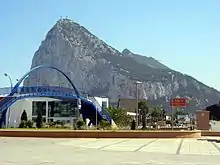
Gibraltar seen from Spain
- Three days after accusing Britain's Royal Air Force of flying over Spanish territory in order to reach Gibraltar [123] Spain closed off its border crossing at La Línea de la Concepción, the only land connection between the British colony and the rest of Europe.[124]
- The Luna 12 space probe, launched by the Soviet Union on October 22, entered orbit around the Moon in order to photograph potential landing sites for a manned mission. With higher resolution television cameras (1100 scan lines) and a closer orbital approach than previous Soviet probes (as near as 103 kilometers), Luna 12 returned images in which 15 meter long objects could be discerned. Most of the photos, taken from a nearly equatorial lunar orbit, were not released.[125][126]
- The British House of Commons voted 307-239 to approve the Labour government's compulsory freeze on wages and prices, with a 500-pound sterling fine against violators.[127]
- Died: Floyd MacMillan Davis, 70, American illustrator
October 26, 1966 (Wednesday)
- A fire aboard the aircraft carrier USS Oriskany in the Gulf of Tonkin killed 44 crewmen and seriously injured 15 others. Thirty-four of the dead were officers, and 24 of them were U.S. Navy pilots. At 7:21 a.m., the fire began in a locker containing flares and spread through the forward hangar bay, eventually burning parts of five decks.[128][129] An investigation found that the fire had been caused initially by the careless handling of a single magnesium parachute flare, which accidentally ignited after two sailors were returning unused flares from aircraft to a storage compartment. In a panic, one of the men tossed the flare into a storage locker containing 700 more flares, setting off flames hot enough to melt metal.[130] The loss of life would have been greater had it not been for the work of crewmen who were able to push 343 of the ship's bombs, some of them weighing 2,000 pounds, overboard.[131]
- The 15 member North Atlantic Council voted unanimously to move NATO headquarters from Paris to Brussels, giving up its $9,000,000 building after only six years.[132]
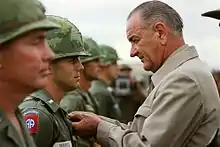
LBJ in Vietnam
- U.S. President Johnson stopped briefly in South Vietnam after the conclusion of a summit meeting in the Philippines. Air Force One landed at the Cam Ranh Base in an unannounced visit, and Johnson spent almost two and a half hours addressing American troops, then personally presenting medals, including 24 Purple Hearts to wounded men at the base hospital.[133]
- After resolutions by both Houses of the British Parliament, the Secretary of State for Wales appointed a tribunal to inquire into the causes of and circumstances relating to the Aberfan disaster, chaired by Lord Justice Edmund Davies.[134]
- Major-General Léonard Mulamba was removed from his post as prime minister of the Democratic Republic of the Congo by President Mobutu.[135]
- Died: Alma Cogan, 34, English pop music singer, of ovarian cancer
October 27, 1966 (Thursday)
- The United Nations General Assembly voted, 114-2, to end the South African Mandate over the former German colony of South West Africa, with the two "no" votes coming from South Africa and from Portugal, whose colony of Angola bordered the Mandate territory. France and the United Kingdom abstained.[136] The post of United Nations Commissioner for South-West Africa was established, and Anton Vratuša would be the first office holder, unable to administer the colony, however, because South Africa maintained that the U.N. had no right to interfere with the 1920 decision of the defunct League of Nations.
- Erich Mende resigned his post as Vice-Chancellor of West Germany. Mende, the Chairman of the Free Democratic Party, quit along with three other FDP members, Finance Minister Rolf Dahlgruen, Economic Cooperation Minister (and future President) Walter Scheel, and Housing Minister Ewald Bucher. The four were all part of the coalition that made up the second Cabinet of Chancellor Ludwig Erhard, leaving Erhard of the Christian Democratic Union with a minority government.[137] Hans-Christoph Seebohm was appointed to succeed Mende. Chancellor Erhard himself, unable to form an acceptable government, would resign on November 30.[138]
- In the United States, the CBS television network premiered It's the Great Pumpkin, Charlie Brown as a Halloween-themed animated presentation based on the comic strip Peanuts. The popular cartoon episode has been shown annually since then during the last week in October, for 35 years on CBS, and (since 2001) on the ABC network.[139]
- Born: Matt Drudge, American political commentator who created The Drudge Report; in Takoma Park, Maryland
- Died: Barry Faulkner, 85, American mural painter
October 28, 1966 (Friday)
- The People's Republic of China announced, through its official Xinhua News Agency, that it claimed sovereignty over territory within the independent Buddhist Kingdom of Bhutan. According to the Chinese announcement, the fertile Dong Nang grasslands at the base of the Himalayan Mountains were owned by China and Bhutanese farmers who used the land for cattle grazing would have to pay taxes to the Beijing government.[140]
- An investigation was started by the U.S. Federal Trade Commission (FTC) of games of chance sponsored by supermarkets, including "supermarket bingo" and sweepstakes, in order to determine whether the contests were illegal, unwinnable, or had increased food prices. The FTC called on grocery stores to voluntarily eliminate "any practices that are unfair or deceptive or that unjustifiably add to the American housewife's grocery bill." [141]
- Born:
- Andy Richter, American television comedian, in Grand Rapids, Michigan
- Steve Atwater, American NFL defensive back, in Chicago
- Died: Robert Charpentier, 50, French cyclist who won three gold medals in the 1936 Summer Olympics in Berlin.
October 29, 1966 (Saturday)
- Nineteen airline passengers from the African nation of Guinea, including the nation's Foreign Minister and it delegation to the Organization of African Unity meeting in Ethiopia, were removed from a Pan American World Airways flight when it made a stop in Accra, the capital of Ghana. All 19, led by Foreign Minister Joseph Ankrah, were detained as prisoners by the government, which said that it was retaliating against Guinea for imprisoning Ghanaian citizens. The U.S. Ambassador to the African nation of Guinea, Robinson McIlvaine, was placed under house arrest at his residence in Conakry, in retaliation for the imprisonment of the Guinean Foreign Minister in Ghana. The Guinean government charged that McIlvaine and the United States were responsible for the Ghana incident.[142] The OAU and the Ethiopian Justice Minister would mediate the confrontation, and the 19 prisoners would be released on November 5, after it was determined that none of the alleged prisoners in Guinea wished to return to Ghana.[143]
- Less than three months after its launch on August 10, Lunar Orbiter 1 was deliberately pulled out of orbit by NASA Ground Control, and crashed into the Moon. The NASA decision, which came even as the Soviet lunar orbiter, Luna 12, was sending back photographs to the U.S.S.R., was done in order to avoid interference with the Lunar Orbiter 2 probe that would launch on November 6.[144] The crash was accomplished by transmitting a command to fire a retrorocket that slowed the probe's speed from 2,150 to 1,750 miles per hour, causing a sufficient loss of momentum to make the vehicle glide to an impact on the far side of the Moon.[145] Regarding all four Lunar Orbiters, a historian would write later, "With a total cost of the entire project at $163 million, they were almost certainly the world's most expensive disposable cameras."[146]
- The first regeneration of Doctor Who took place, as the Doctor's face changed from that of actor William Hartnell to that of his successor, Patrick Troughton. Hartnell, at 58, was supposedly exhausted from the production schedule,[147] so in the story, The Tenth Planet, the Doctor remarked "This old body of mine is wearing a bit thin," and collapsed. With the aid of a slow mix and dissolve, the closeup view of Hartnell's face was gradually replaced by that of the 46-year-old Troughton.[148]
- The National Organization for Women (NOW) was officially incorporated during its first national conference, held in Washington, DC, and adopted a preamble that declared its purpose to be "to take action to bring women into full participation in the mainstream of American society now, exercising all the privileges and responsibilities thereof in truly equal partnership with men."[149]
- Celtic defeated Rangers, 1-0, to win the 1966 Scottish League Cup Final, held at Hampden Park in Glasgow in front of 94,532 spectators.[150][151]
- Valued at half a million dollars, the Antonio da Correggio painting Madonna and Child with the infant Saint John the Baptist was stolen from the Art Institute of Chicago. Seventeen hours later, an anonymous phone call was made to the Institute, and the 450-year-old painting, wrapped in brown paper and tied with a string, was found in a wastebasket downtown, with moderate and permanent damage.[152]
- Queen Elizabeth II of the United Kingdom and her consort Prince Philip, Duke of Edinburgh, visited Aberfan to pay their respects to those who died in the disaster.[153]
- A penumbral lunar eclipse took place.[154][155]
- Died: Jocelyn Brooke, 57, English author best known of the "Orchid Trilogy" of books, which he started with 1948's The Military Orchid
October 30, 1966 (Sunday)
- Cheri Jo Bates, an 18-year old freshman at Riverside Community College in northern California, was brutally murdered after leaving the campus library at closing time.[156] When her body was found the next morning, she had been "slashed three times in the chest, once in the back, and seven times in her throat" with a wounds "so extensive that she was nearly decapitated".[157] An anonymous letter, claiming responsibility for the killing, would be received by city police on November 29,[158] with the warning that Bates "is not the first and she will not be the last". The form of the murders, and the wording of the letters, were similar enough to that of the Zodiac Killer [159] that Bates would be considered to have likely been his first victim.
- The Delhi High Court was established, with four judges.[160]
- The Montreal Alouettes defeated the Ottawa Rough Riders 1-0 in the lowest-scoring game in Canadian Football League history and a record for modern pro football history. The Als' score came when kicker Peter Kempf attempted a 25-yard field goal and the wind sent the ball wide; the Riders' Don Gilbert fell on the missed kick in the end zone, which gave Montreal a single point under CFL rules. A previous 1-0 game had happened in 1949, before the CFL was founded by a merger of two leagues.[161]
- Born:
- Abu Musab al-Zarqawi, Iraqi-born Sunni militant and operative for al-Qaeda, who coordinated suicide bombings against U.S. forces and Shi'ite Muslims; in Hibhib (killed in air raid, 2006)
- Zoran Milanović, President of Croatia 2020 to present, Prime Minister of Croatia from 2011 to 2016, in Zagreb, Yugoslavia
- Died:
- Dr. Smiley Blanton, 84, American psychiatrist who, along with the Reverend Norman Vincent Peale, created the profession of pastoral counseling, an integration of psychiatry and religion. They co-founded the Religio-Psychiatric Clinic in 1937, and later the American Foundation of Religion and Psychiatry, as well as authoring Faith Is the Answer: A Psychiatrist and a Pastor Discuss Your Problems and The Art of Real Happiness [162]
- John Drainie, 50, Canadian radio and television actor who was dubbed, by Orson Welles, as "the greatest radio actor in the world" for the lead role in Jake and the Kidd
- Bill Farnsworth, 79, Australian rugby and cricket star
October 31, 1966 (Monday)
- Staff Sergeant Herbert W. Boeckenhaupt, a 23-year old U.S. Air Force officer, was arrested at March Air Force Base in California, where he worked as a communications repairman and had top secret clearance.[163] After the FBI presented evidence that he had conspired to deliver national defense secrets to Soviet Embassy counselor Aleksey R. Malinin, Boeckenhaupt would be convicted of espionage and sentenced to 30 years in federal prison [164] and Malinin would be expelled from the United States. He was ordered to be released from prison by a Federal Judge for the Middle District of Pennsylvania in March, 1978 after a writ of habeas corpus was filed, and granted, that he was being held improperly for non-statutory reasons. The Court granted the petition for release. The government did not appeal the decision.
- A footlocker, containing the materials from the 1963 autopsy of U.S. President John F. Kennedy, was brought to the National Archives Building following an authorization by the Kennedy family, and opened in the presence of the officials from the Archives, the Government Services Administration, and the U.S. Department of Justice, on condition that the contents not be available for five years. When an inventory was made, eight of the nine sets of items were available, the stainless steel container that had contained Kennedy's brain was found to be empty. Explanations differ, with some authors believing it to be part of the coverup of a conspiracy, the custodian, Burke Marshall would testify in 1978 that the brain tissue was disposed of by Attorney General Robert F. Kennedy in order to prevent it from being "placed on public display in future years in an institution such as the Smithsonian." [165]
- U.S. President Johnson, on his first visit to Malaysia, stopped at Kampung Labu Jaya village in Negeri Sembilan state. The village would rename itself Kampung L.B. Johnson in honor of the 36th American president.[166]
- John Paul Chase, a henchman in the gangs of Baby Face Nelson, John Dillinger and Alvin Karpis during the 1930s, was paroled from Leavenworth Federal Prison after 30 years. He had been convicted in 1935 of the murder of FBI Agent Samuel Cowley. Chase, 64 years old, would spend the last years of his life as a janitor in California before dying of cancer on October 5, 1973.[167]
- Born:
- Ad-Rock (stage name for Adam Keefe Horovitz), American guitarist and co-founder of the hip hop trio The Beastie Boys; in Manhattan, New York City
- Mike O'Malley, American television and film actor, in Boston
References
- "From the archive, 1 October 1966: Nazi leaders freed after 20 years", The Guardian, 1 October 2014. Accessed 28 November 2014
- "Crowd Jeers as Nazis Freed", Ottawa Journal, October 1, 1966, p1
- "Russ Bar Freedom for Rudolf Hess", Chicago Tribune, October 2, 1966, p1
- "Hunt Missing Jet with 20 in Mountains", Chicago Tribune, October 2, 1966, p1
- Aircraft Accident Report. West Coast Airlines, Inc DC-9 N9101. Near Wemme, Oregon Archived 2008-02-16 at the Wayback Machine, Adopted: 11 December 1967
- "INEZ HITS BOAT; 45 LOST". Chicago Tribune. October 8, 1966. p. 1.
- "Do You Want To Buy Town?". Muscatine (IA) Journal. October 1, 1966. p. 1.
- "Iowa Village Sold For $15,300". La Crosse (WI) Tribune. October 5, 1966. p. 9.
- "Once Thriving Iowa Town Auctioned Off". Chicago Tribune. November 26, 1966. p. 1.
- "British Film Institute ScreenOnline site".
- "BFI TV 100 site". Archived from the original on 2012-03-21. Retrieved 2014-11-27.
- "KOUFAX PITCHES DODGERS TO PENNANT!". Chicago Tribune. October 3, 1966. p. 3-1.
- {{cite news |title=White Sox And Rain Give Yankees Last Place Finish |journal=Newport (RI) Daily News |date=October 1, 1966 |page=8
- "Soviets Admit Troops Are in N. Viet Nam". Chicago Tribune. October 3, 1966. p. 5.
- Van Ness, Peter (1970). Revolution and Chinese Foreign Policy: Peking's Support for Wars of National Liberation. 34. University of California Press. p. 154. GGKEY:966F0LCC9P2.
- "Brazil's Congress Picks President". Albuquerque (NM) Journal. October 4, 1966. p. 4.
- "Costa e Silva já está eleito" [Costa e Silva already elected]. Folha de S.Paulo (in Portuguese). São Paulo. Folha. 4 October 1066. p. 1.
- "Can't Support Maddox, Quits Georgia Race". Chicago Tribune. October 4, 1966. p. 4.
- Kerr, R. A. (31 May 2013). "Radiation Will Make Astronauts' Trip to Mars Even Riskier". Science: 1031–1031.
- "Lesotho", in An Encyclopedic Dictionary of Conflict and Conflict Resolution, 1945-1996, by John E. Jessup (Greenwood Press, 1998) p423
- Obituary: King Moshoeshoe II of Lesotho by Benjamin Pogrund in The Independent, 16 January 1996 (accessed 3 November 2007)
- "Lesotho Now New Nation in Africa", Tucson (AZ) Daily Citizen, October 4, 1966, p17
- "Israel Asks to Have Common Market Tie", Bridgeport Telegram, October 5, 1966, p18
- Frank Lees, Lees' Loss Prevention in the Process Industries: Hazard Identification, Assessment and Control (Butterworth-Heinemann, 2005) p20/9
- Van Jackson, Rival Reputations: Coercion and Credibility in US-North Korea Relations (Cambridge University Press, 2016) pp29-30
- "Ruby Wins New Trial", Chicago Tribune, October 6, 1966, p1
- Sean Scalmer, Dissent Events: Protest, the Media, and the Political Gimmick in Australia (University of New South Wales Press, 2002) p46
- "Many New California Laws Go Onto Books", Daily Independent Journal (San Rafael, CA), October 6, 1966, p1
- Albert Somit and Steven A. Peterson, Biopolicy: The Life Sciences and Public Policy (Emerald Group Publishing, 2012) p232
- "LSD Bill Signed by Brown", Independent (Long Beach CA), May 31, 1966, p1
- Michael J. Kramer, The Republic of Rock: Music and Citizenship in the Sixties Counterculture (Oxford University Press, 2013) p59
- "Shirin to become first woman Speaker". bdnews24.com. 29 April 2013. Retrieved 29 April 2013.
- "Train Hits School Bus; Death Toll At Least 22", Montreal Gazette, October 8, 1966, p1
- "Inquiry Pressed As Area Morns 19 Dead In Crash", Montreal Gazette, October 10, 1966, p1
- "Planet 'tour' planned", The Age (Melbourne), October 8, 1966, p4
- "Space Cue: Planetary Billiards", AP report by Ralph Dighton, Courier-Journal (Louisville KY), November 27, 1966, p4
- "The Grand Tour: 11-Year Trip to Outer Planets", Los Angeles Times, April 13, 1969, p1
- "Russia Ousts All Chinese Students", Tucson (AZ) Daily Citizen, October 7, 1966, p1
- Warren I. Cohen and Nancy Bernkopf Tucker, Lyndon Johnson Confronts the World: American Foreign Policy 1963-1968 (Cambridge University Press, 1994) p197
- "Remarks in New York City Before the National Conference of Editorial Writers", The American Presidency Project, UC-Santa Barbara
- Dave Thompson, Smoke on the Water: The Deep Purple Story (ECW Press, 2004) p13
- "11 Die in Gulf Copter Crash", Chicago Tribune, October 9, 1966, p1
- "RUSS SPURN PEACE PARLEY", Chicago Tribune, October 9, 1966, p1
- "Ministro de Defensa cierra toda posibilidad tras accidente en Juan Fernández: No hay sobrevivientes" [Defense Ministry rules out any possibility after accident in Juan Fernández: There were no survivors]. Radio Bio-Bío. 3 September 2011. Archived from the original on 24 November 2011. Retrieved 3 September 2011.
- "BALTIMORE THE CHAMPS!", Chicago Tribune, October 10, 1966, p1
- Armstrong, Charles (2001). Critical Asian Studies, Volume 33, Issue 4: America's Korea, Korea's Vietnam. Routledge.
- John Billingham and Rudolf Pešek, Communication with Extraterrestrial Intelligence (Elsevier, 2013) pp3-5
- Barry Miles, The British Invasion (Sterling Publishing Company, 2009) p237
- "Jury Convicts Rep. Powell", Chicago Tribune, October 11, 1966, p1
- "Shaping the Synthesizer", by Trevor Pinch and Frank Trocco, in The Sound Studies Reader, by Jonathan Sterne (Routledge, 2012) p261
- Sebastian Mayer, NATO’s Post-Cold War Politics: The Changing Provision of Security (Springer, 2014) p319
- Salina Journal, 11 October 1966, p2. Accessed 13 November 2014
- "New Opportunities for Communication— Consumer and Marketing Service", by Bertha F. Olsen, in Proceedings of Nutrition Education Conference: February 20–22, 1967 (U.S. Department of Agriculture, 1968) p38
- "Beyond Post-Socialist Conversions: Functional Cooperation and Trans-Regional Regimes in the Global South", by Diane Brook Napier, in Post-Socialism Is Not Dead: (Re)Reading The Global In Comparative Education (Emerald Group, 2010) p423
- Maria Helena Moreira Alves, State and Opposition in Military Brazil (University of Texas Press, 1988) p72
- Neil Butterworth, Dictionary of American Classical Composers (Routledge, 2013)
- "Chicago Medic Nobel Winner", Chicago Tribune, October 14, 1966, p1
- Sue Harper and Justin Smith, British Film Culture in the 1970s: The Boundaries of Pleasure (Edinburgh University Press, 2011) pp36-37
- "The Dream Comes True— Metro Opens", Montreal Gazette, October 15, 1966, p1
- "Netherlands Premier, Cabinet Resign", Tucson (AZ) Daily Citizen, October 14, 1966, p2
- "British Find Stamp Flaws", San Mateo (CA) Times, October 15, 1966, p20
- Walter L. Hixson, The United States and the Vietnam War: Leadership and diplomacy in the Vietnam War (Taylor & Francis, 2000) p57
- Christoph H. Schreuer, The ICSID Convention: A Commentary (Cambridge University Press, 2001) p xi
- Michael Brecher and Jonathan Wilkenfeld, A Study of Crisis (University of Michigan Press, 1997) p328
- McDowell, Jonathan. "Launch Log". Jonathan's Space Page. Retrieved 4 January 2014.
- "Dept. of Transport Created by Johnson", Chicago Tribune, October 16, 1966, p3
- This Is Your Government: The Department of Transportation (Rosen Publishing Group, 2006)pp12-13
- "Historic Preservation", in Encyclopedia of Twentieth Century Architecture, by R. Stephen Sennott (Taylor & Francis, 2004) p616
- Amy Abugo Ongiri, Spectacular Blackness: The Cultural Politics of the Black Power Movement and the Search for a Black Aesthetic (University of Virginia Press, 2010) p43
- Rickey Vincent, Party Music: The Inside Story of the Black Panthers' Band and How Black Power Transformed Soul Music (Chicago Review Press, 2013) p67
- John Glatt, Live at the Fillmore East and West: Getting Backstage and Personal with Rock's Greatest Legends (Rowman & Littlefield, 2014) p79
- Nohlen, D & Stöver, P (2010) Elections in Europe: A data handbook, p1919 ISBN 9783832956097
- "Quake Shakes Peru Coast; Report 83 Die", Chicago Tribune, October 18, 1966, p1
- "Peru Quake Death Toll Put at 120", Chicago Tribune, October 18, 1966, p3
- Peter Marshall, Backstage with the Original Hollywood Square (Thomas Nelson, 2002)
- "Celebrity Squares (Australia)", NostalgiaCentral.com
- "Housewives Open Fight On Prices", AP report in Amarillo (TX) Globe-Times, October 17, 1966, p1
- "The Housewives' Battle to Lower Food Costs Spreads Across U.S.", Bridgeport (CT) Telegram, October 22, 1966, p1
- "Boycott of Housewives Spreads in 21 States", Colorado Springs (CO) Gazette-Telegraph", October 30, 1966, p1
- http://library.cqpress.com/cqresearcher/document.php?id=cqresrre1966112300#H2_1
- Hugh Macmillan, An African Trading Empire: The Story of the Susman Brothers and Wulfsohn, 1901-2005 (I.B.Tauris, 2005) p361
- ZambiaTourism.com
- "12 Dead: The Department's Worst Fire; 'Absolute Nightmare,' Mayor Says", New York Times, October 19, 1966, p1
- "N.Y. Shaken By Death of 12 Firemen", Bridgeport (CT) Post, October 19, 1966, p1
- Vincent Dunn, Safety and Survival on the Fireground (Fire Engineering Books, 2015) p147
- David Yallop, Beyond Reasonable Doubt? (Little, Brown Book Group, 2014)
- "New Ford Cortina With More Room". The Glasgow Herald. 18 October 1966. p. 6. Retrieved 2013-03-05.
- Amnon Kabatchnik, Blood on the Stage, 1950-1975: Milestone Plays of Crime, Mystery, and Detection (Scarecrow Press, 2011) p457
- "Set Elizabeth Arden Estate at 50 Millions", Chicago Tribune, October 28, 1966, p3
- "S.S. Kresge, Dime Store Magnate, Dies", Chicago Tribune, October 19, 1966, p2
- "Orr, Robert Gordon 'Bobby'", in Historical Dictionary of Ice Hockey, by Laurel Zeisler (Scarecrow Press, 2012) p240
- Bernard F. Dick, Engulfed: The Death of Paramount Pictures and the Birth of Corporate Hollywood (University Press of Kentucky, 2015) p103
- Boris Chertok, Rockets and People, Volume III: Hot Days of the Cold War (NASA, 2009) p512
- Christian Lardier and Stefan Barensky, The Soyuz Launch Vehicle: The Two Lives of an Engineering Triumph (Springer, 2013) p196
- "Ex-Sen. Byrd of Virginia Dies; Fiscal Watchdog in Coma Since Early July", Chicago Tribune, October 21, 1966, p1
- Lee Allyn Davis, Natural Disasters (Infobase Publishing, 2010) p23
- "Hiraeth: Connecting with the land"
- "1966: Coal tip buries children in Aberfan". BBC. 21 October 1966. Retrieved 14 February 2013.
- "Fear 137 Perish in Landslide", Chicago Tribune, October 22, 1966, p1
- Michael MacCambridge, America's Game: The Epic Story of How Pro Football Captured a Nation (Knopf Doubleday, 2008) p229
- "Congress Passes Merger; Awaits LBJ's Hand", Troy (NY) Record, October 22, 1966, p16
- "New Orleans Gets NFL Pro Grid Franchise", Monroe (LA) News-Star, November 1, 1966, p1
- Taylor, John W. R. Jane's All The World's Aircraft 1976–77. London:Jane's Yearbooks, 1976. ISBN 0-354-00538-3. p448-9
- "Double-agent breaks out of jail". BBC News. 22 October 1966. Archived from the original on 7 March 2008. Retrieved 2008-02-03.
- "British Spy Flees Prison", Chicago Tribune, October 23, 1966, p1
- "British Spy Who Fled Jail Now Traced to Soviet Union", Nashua (NH) Telegraph, September 25, 1967, p10
- "Blake, George", in Encyclopedia of Cold War Espionage, Spies, and Secret Operations, by Richard C. S. Trahair and Robert L. Miller (Enigma Books, 2013) pp32-34
- "Ships Crash, 28 Killed in Manila Bay", Chicago Tribune, October 23, 1966, p3
- "40 die in collision off Manila". The Times (56770). London. 24 October 1966. col B, p. 7.
- Vice Admiral G.M. Hiranandani (retired), Transition to Guardianship: The Indian Navy 1991–2000 (Lancer Publishers, 2013)
- Paco Ignacio Taibo, Guevara, Also Known as Che (Macmillan, 1999) p630
- Jack DeSario and William D. Mason, Dr. Sam Sheppard on Trial: The Prosecutors and the Marilyn Sheppard Murder (Kent State University Press, 2003) p58
- "Sof'ya Aleksandrovna Janovskaja", Biographies of Women Mathematicians, Agnes Scott College
- "Second Artillery Corps (Strategic Rocket Force)", in China at War: An Encyclopedia: An Encyclopedia, Xiaobing Li, ed.
- "ATOM MISSILE FIRED: CHINA", Chicago Tribune, October 28, 1966, p1
- Nguyen Phu Duc, The Viet Nam Peace Negotiations: Saigon's Side of the Story (Dalley Book Service, 2005) p35
- "LBJ, ALLIES OFFER TROOP PULLOUT WITHIN 6 MONTHS AFTER A PEACE", Bridgeport (CT) Post, October 25, 1966, p1
- Wallace J. Thies, When Governments Collide: Coercion and Diplomacy in the Vietnam Conflict, 1964-1968 (University of California Press, 1980) p339
- "No Munich for Vietnam Reds", Kansas City Times, October 25, 1966, p1
- Hughes, John (2002), The End of Sukarno – A Coup that Misfired: A Purge that Ran Wild, Archipelago Press, p.19, ISBN 981-4068-65-9
- "Subandrio Sentenced to Death by Jakarta Tribunal", Chicago Tribune, October 26, 1966, p2-9
- "British Overflying Zone, Spain Claims", Ogden (UT) Standard-Examiner, October 23, 1966, p7
- "Spain Shuts Off Traffic To Gibraltar", Corpus Christi Caller-Times, October 25, 1966, p12-C
- Merton Davies and Bruce C. Murray, The View from Space: Photographic Exploration of the Planets (Columbia University Press, 1973) p41
- Robert Reeves, The Superpower Space Race: An Explosive Rivalry through the Solar System (Springer, 2013) p118
- "Commons OK's Labor Regime's Wage Freeze", Chicago Tribune, October 26, 1966, p1A-6
- "Carrier Fire Kills 43", Chicago Tribune, October 27, 1966, p1
- "A Carrier's Agony— Hell Afloat", LIFE Magazine, November 25, 1966
- Norman Polmar, Aircraft Carriers: A History of Carrier Aviation and Its Influence on World Events, Volume II: 1946-2006 (Potomac Books, 2008) p253
- "Oriskany, USS, Fire aboard", in The Encyclopedia of the Vietnam War: A Political, Social, and Military History, Spencer C. Tucker, ed. (ABC-CLIO, 2011) pp866-867
- "NATO Council Will Shift Its Offices to Brussels", Chicago Tribune, October 27, 1966, p10
- "Lyndon Goes to Viet Nam, Salutes GIs", Chicago Tribune, October 27, 1966, p1
- UK Resilience website – National Recovery Guidance – Case Studies: The Aberfan Disaster Archived 2010-11-26 at the UK Government Web Archive
- E.F. Kisangani et al., Historical Dictionary of the Democratic Republic of the Congo, p 375.
- "U.N. Votes to Rule S.W. Africa", Chicago Tribune, October 28, 1966, p1
- "4 Erhard Aids Quit; Coalition Collapses", Chicago Tribune, October 28, 1966, p17
- R. Gerald Hughes, Britain, Germany and the Cold War: The Search for a European Détente 1949–1967 (Routledge, 2007) p143
- Beverly Gherman, Sparky: The Life and Art of Charles Schulz (Chronicle Books, 2013) p121
- "China lays claim to Bhutanese territory", The Indian Express (Madras), October 29, 1966, p1
- "FTC Probes Supermarket Games", Milwaukee Journal, October 29, 1966, p3
- "Guinea Holds U.S. Envoy in Residence". Chicago Tribune. October 30, 1966. p. 3.
- Bercovitch, Jacob; Fretter, Judith (2004). Regional Guide to International Conflict and Management from 1945 to 2003. Congressional Quarterly Press. p. 73.
- "Crash Orbiter 1". Chicago Tribune. October 30, 1966. p. 3.
- Cherrington, Ernest H. (2013). Exploring the Moon Through Binoculars and Small Telescopes. Courier Corporation. p. 73.
- Capelotti, P.J. (2010). The Human Archaeology of Space: Lunar, Planetary and Interstellar Relics of Exploration. McFarland. p. 55.
- Decker, Kevin S. (2013). Who is Who?: The Philosophy of Doctor Who. I.B.Tauris. p. 132.
- Chapman, James (2006). Inside the Tardis: The Worlds of Doctor Who. I.B.Tauris. p. 49.
- Sinopoli, Richard C., ed. (1996). From Many, One: Readings in American Political and Social Thought. Georgetown University Press. p. 150.
- Soccerbase
- "Celtic Outplayed by Rangers but Retain League Cup". Glasgow Herald. October 31, 1966. p. 4.
- "FIND STOLEN ART TREASURE". Chicago Tribune. October 31, 1966. p. 1.
- "Her Majesty: new book of photographs celebrating the life of Queen Elizabeth II". Daily Telegraph.
- Hermit Eclipse: Saros cycle 116
- "While You Slept This A.M. There Was an Eclipse". Chicago Tribune. October 29, 1966. p. 1.
- "South State Co-ed Slain", San Mateo (CA) Times, October 31, 1966, p1
- Dirk C. Gibson, Clues from Killers: Serial Murder and Crime Scene Messages (Greenwood, 2004) p90
- "Letter Writer Admits Killing Riverside Coed", San Bernardino (CA) County Sun, December 2, 1966, p20
- "Zodiac Still Taunts, Threatening to Kill", Waco (TX) Tribune-Herald, December 20, 1970, p10-D
- "History – Delhi HC". delhihighcourt.nic.in. Retrieved 2 March 2012.
- "Als Slip By Riders 1-0, Tie Record Low", Montreal Gazette, October 31, 1966, p25
- Beate Lohsher and Peter M. Newton, Unorthodox Freud: The View from the Couch (Guilford Press, 1996) p118
- "GI Is Accused As Spy", Kansas City Times, November 1, 1966, p1
- "Boeckenhaupt, Staff Sergeant Herbert W.", in Spies, Wiretaps, and Secret Operations: An Encyclopedia of American Espionage, by Glenn P. Hastedt (ABC-CLIO, 2011) p100
- Vincent Bugliosi, Reclaiming History: The Assassination of President John F. Kennedy (W. W. Norton & Company, 2007) pp430-431
- Malaysia at Random (Editions Didier Millet, 2009) p100
- Henry M. Holden, FBI 100 Years: An Unofficial History (Zenith Imprint) pp70-71
This article is issued from Wikipedia. The text is licensed under Creative Commons - Attribution - Sharealike. Additional terms may apply for the media files.
